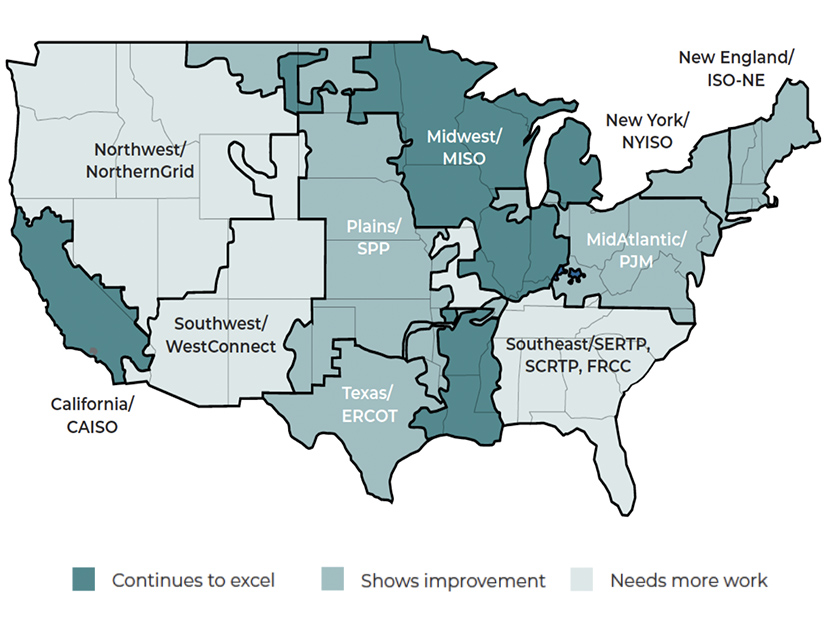
With the Order 1920 compliance window already halfway closed and an order on rehearing expected in the next couple of months, Americans for a Clean Energy Grid (ACEG) hosted a webinar Oct. 28 examining progress on the measure so far.
The group worked with Grid Strategies to release an update to its regional transmission report card, which showed all U.S. organized markets recently have been looking at changes to their planning practices. (See ACEG Report Checks in on Regional Planning After Order 1920.)
The original report, which predated Order 1920, attempted to examine best practices in planning. With Order 1920 compliance efforts underway, it was time for an update, said Rob Gramlich, president of Grid Strategies and co-author of both reports.
“There’s some signs of improvement,” Gramlich said. “CAISO and MISO continue to proceed with what they’re doing, which is, you know, largely close to Order 1920 and the best practices.”
CAISO and MISO received the best grades in the initial report, and other markets have all made improvements, though the report said areas outside organized markets — the Southeast and most of the West — have done little in terms of region-wide transmission planning, he added.
Compliance filings are due next summer, but some regions are starting to work on them. For example, several regions have launched their state engagement periods, which give six months for state regulators to craft a regional cost allocation methodology, said ACEG Executive Director Christina Hayes.
SPP launched that process Oct. 28 and its Regional State Committee was poised to vote on whether it would be the venue for those cost allocation discussions, said Christy Walsh, a senior attorney at the Natural Resources Defense Council. Walsh watches the organized markets for NRDC and its Sustainable FERC Project, and she noted a similar attitude among many of them.
“They say: ‘We know there’s need for regional transmission — it brings reliability and affordability benefits, but we’re doing it right,’” Walsh said.
WIRES Executive Director Larry Gasteiger said he sees some of that messaging from the RTOs/ISOs, but contended they still have many issues to deal with.
“What I really think is happening is they are saying we are working hard on trying to address these concerns. We think we’re meeting them in some respects,” he added. “I think there’s an acknowledgement that there can be some improvements, but I’m also hearing it against the background where they’re trying to get a heck of a lot of other things done at the same time.”
MISO got good grades on its ACEG report card, but it has asked for a year delay in complying with Order 1920 to avoid disturbing its ongoing planning processes. (See MISO to Request Year Deferral on FERC Order 1920.)
ISO-NE got a most-improved nod from Gramlich because of its recent work with member states around transmission planning, but it recently put a pause on Order 1920 compliance due to uncertainty around the rule’s fate. (ISO-NE Announces Pause of Order 1920 Compliance Discussions.)
Rehearing Order Imminent
In general, major FERC orders have not undergone significant changes on rehearing, but that might not be the case with 1920, Gasteiger said.
“There were some stark differences right from the get-go on this rule, and I don’t know with three new commissioners how that’s going to play out,” he said. “My guess is not huge changes, but I think the potential for more significant changes is greater here than in the past.”
FERC is expected to issue a rehearing order in the next couple of months because it has asked the 4th U.S. Circuit Court of Appeals to hold off on its review of the order until January, Walsh said. Gramlich agreed a rehearing order likely will come soon.
Another looming area of uncertainty is the elections, as a change in the White House would mean a change in FERC chairs and eventually a shift to a Republican majority on the commission.
“To the extent some regions are not racing [toward] compliance, I do think the industry will get some more clarity in the next couple of months about some things, and hopefully at that point they’ll be moving forward quickly,” Gramlich said.



